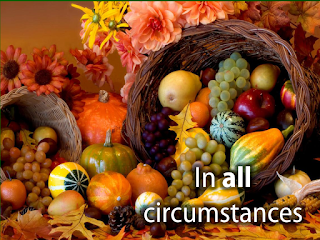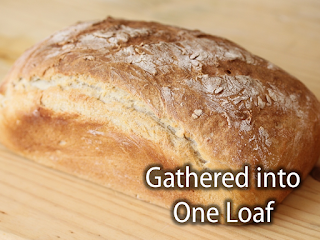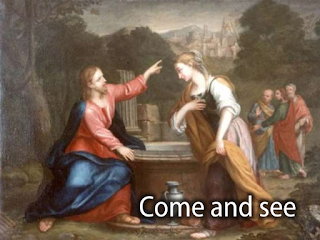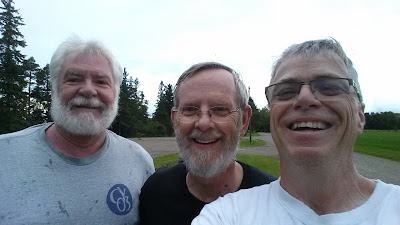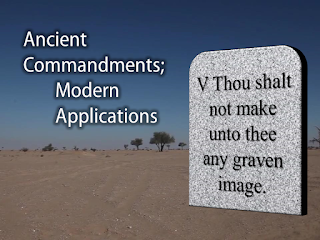Hespeler, 23 October, 2016 © Scott McAndless – Baptism
Genesis 18:1-15; 21:1-7, Psalm 126, Luke 6:20-21
I |
f you are going to understand the two stories that we read from the Book of Genesis this morning, you need to learn the meaning of one Hebrew word. If you do not know this word, you totally miss the point of both of the stories. The word is yitschaq and it is the Hebrew word for laughing. It has been suggested that it might be an onomatopoetic word – that is, a word that sounds like the thing that it describes (you know, like the word quack sounds like the noise a duck makes and the word bark, like the noise of a dog). Apparently, to an ancient Hebrew ear, laughter sounded a little bit like somebody going “yitschaq, yitschaq, yitschaq.” I guess that some ancient Hebrews just had weird laughs.
That Hebrew word is important because laughter is an important theme in both stories we read this morning. In one, Sarah laughs in her tent when she hears an angel promise her husband that she will have a child even though she is far too old to do so. She laughs because the promise is so impossible as to be ridiculous and later she denies having laughed. In the second story, when the promised child is actually born, Sarah laughs again for the absurdity of her having a child in her old age but she is also laughing for joy.
You get this kind of thing a lot in ancient books like the Bible. Ancient people really loved to tell stories about how people, places and things got their names and the punchlines of these stories were often amusing puns and wordplays. Sometimes people loved these kinds of stories so much that there would even be competing stories about where the name came from like we have here.
The really fun things about these stories is that they were usually created long after the actual naming took place and may have had little connection with what people were actually thinking at the time. Ancient people really didn’t have a clear idea of how words and names are invented. But that was fine because the stories were not really about how something got named. The stories were about deeper truths than that.
Take, for example, these two different stories about how Isaac got his name. One takes place just before the child is conceived and, in it, the laughter is there because the very idea that a woman as old as Sarah could have a child is too ridiculous. The second story takes place after the child has been born. The two stories, it seems to me, help us focus in on different aspects about what it means to bring a child into this world.
But since it is a little bit difficult for us to relate to a child named Yitschaq who was born thousands of years ago to an aged couple named Abraham and Sarah, it might be helpful to relate them to a child who we can actually see and hold and relate to. Let us think of these passages in relation to another child named Isaac born about six weeks ago. A lot of things may have changed in the world since the days of the original Yitschaq, but one thing that hasn’t changed is that, when children come into this world, they bring with them many challenges and problems, but also many blessings and a whole lot of laughter.
In the first story, Sarah, hiding in the tent and listening to God’s promise, laughs. We are told that her laughter springs from what she says to herself: “After I have grown old, and my husband is old, shall I have pleasure?” She laughs because, though she greatly desires a child and long has done so, it is just not supposed to happen at this point in her life.
Perhaps she laughs because she realizes that having a child at this point in her life would also bring with it some very particular challenges. How are you supposed to take care of a baby if you are dealing with the typical challenges of old age for example: arthritis? reduced stamina? Heart conditions? How do you deal with the long sleepless nights when you have all of that going on? How is she supposed to even feed her child if, as it says in Genesis, it has “ceased to be with Sarah after the manner of women.” Would a mother even be able to produce milk in such a state? The real challenges of parenthood are only amplified when a child arrives unexpectedly and at a time that is not considered normal according to the culture.
Well, little Isaac who we welcomed into the life of this congregation this morning, was not born to a mother well past the age of childbearing, of course. But, at the same time, he didn’t necessarily come at the usual time for a child, at least according to our modern western culture.
Older cultures had very different ideas about when the ideal time was to have children, of course, but the expectation of modern society seems to be that children should ideally enter into the picture only after the parents’ lives have settled down and they have found a certain economic stability. The modern ideal is that this is only after the mother has had time to establish herself in some career or work. I don’t really know if that modern notion is as ideal as we all seem to think it is – for one thing, it tends to mean that women delay childbearing until other problems, such as infertility, begin to be an issue – but that seems to be how we have decided that it is supposed to be done.
And, no, the arrival of Isaac doesn’t really fit that cultural ideal. That is not to suggest, for one moment that he was not wanted. There are people here who looked forward to his arrival with all the love and expectations that have been there for any child ever born. It is certainly not to suggest that he isn’t loved. But the birth of any child always brings with it certain challenges and that is all the more true when it does not come with that culturally ideal timing and circumstance. I know that Isaac’s arrival will make it more difficult, for example, for his mother to complete all of her education and to set out on a path in her life that will build her own economic security. I mean, it is hard enough for any young person today to start out and to figure out what sort of work is going to still be there for them to do and get paid for even just a few years down the road. That can be a much more difficult road to travel down with a child. The struggles of life are real and we ought not to pretend they aren’t there.
But, and this is the beautiful part, in the story, Sarah doesn’t despair in the tent, she laughs. The laughter may be nervous about possible futures and it may reflect some uncertainty about what that future holds, but it is still laughter, which is a cousin to joy. There are times to worry about and especially to prepare for an uncertain future, but at the same time, it is important to see that God doesn’t just send us those challenges alone. They come mixed with blessing and laughter and I know that so much of that has already come with Isaac and that so much more is yet to come.
God also doesn’t send challenges to us in isolation. One of the greatest blessings that God gives to us is community and, honestly, how could any of us deal with the very real challenges of raising children in the modern world without a community to fall back on. One of the things that makes this event so joyful today is the tremendous amount of support that Isaac and his mother have from their family and their friends, including three godparents (which is perhaps a record here at St. Andrews) who have joyfully and lovingly stepped forward to make their own promises to support and love Isaac and to see that he comes to know the Gospel and finds his own path to live in it. This tremendous level of support means that any challenges will be more than overcome with laughter.
On top of that, of course, is the community of this congregation. We also have stepped forward in this sacrament of baptism to promise to give to Isaac every support that we can to help him grow into a man who can someday chose for himself how he serves God and lives according to God’s will in this world. That is, as far as I am concerned, the most important aspect of our celebration of baptism today and I hope it is something that we never lose sight of. Because of our commitment and our joining together with Isaac, his mother, his family and his friends, the joy and the laughter is only magnified because we all get to join in it together.
In the Book of Genesis, Sarah’s laughter after her son has been born seems a little bit different than in the first story. “God has brought laughter for me; everyone who hears will laugh with me,” She says. “Who would ever have said to Abraham that Sarah would nurse children? Yet I have borne him a son in his old age.” This seems more of a laughter of pure joy than anything else. It still seems a bit ridiculous to her that she should have a child in this season of her life, of course, but any apprehension seems to have dissolved away into pure joy.
I do rather feel that we are much more in the frame of mind of the second story here today. I can sense the laughter, the love and joy that surrounds Isaac and his family today. Perhaps some of Sarah’s joy in the Genesis story comes because she is now more focussed on the future than on the past or the present. She looks at this little child that she cradles to her breast and sees, not the troubles and complications that will come with raising him, but the sheer potential that is in him. In the Biblical Yitschaq’s case, that potential is huge because God has promised that, in this little baby’s skin lies, not only the future of one life but of an entire nation. Sarah can already imagine the nation that Yitschaq will become and that will inherit all of the promises that God has already given to Abraham and Sarah themselves.
And potential is absolutely something that we can celebrate in little Isaac here today. I’m not necessarily expecting that he is going to grow up to found an entirely new nation. I think that age for that has passed. But just look at him. Who knows what he might grow up to do or be? He is going to live in a world of wonders and of change that we can scarcely even imagine. I don’t know what new goodness will come into the world because of him, but it is something that I absolutely expect because this Isaac, like the Yitschaq of old, is a child of promise.
Those promises have been repeated here today. He is a child of God. He is beloved of the Most High. He has been claimed by all of his friends and extended family as a part of their family now. He has been claimed by this congregation as a child of this congregation with all of the promises that go with that.
Isaac, you named your child – Yitzchaq in Hebrew. How fitting that you called your child laughter. May he bring much laughter and joy to you, to your family, to this, your church, and to all who meet him. Laughter is a gift of God and any of us are fools if we fail to receive that gift with much thanksgiving.
#140CharacterSermon The story of Isaac teaches us children bring many challenges that become laughter, joy & blessings when we work together


